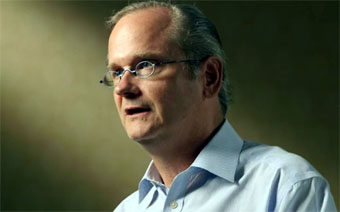
Lawrence Lessig Suspends Campaign
| published November 4, 2015 |
By Keith H. Roberts, Thursday Review contributor
Presidential candidate Larry Lessig says the Democratic National Commitee changed the rules—and the party’s top brass made those changes just as he was on the verge of appearing in the next televised debate.
Lessig, a Harvard professor, author and social thinker, announced late in the summer that he would run for President as a Democrat—but only if he could raise at least $1 million online from small donors before Labor Day. In fact, he raised more than $1 million in less time, an indicator, his supporters said at the time, of the deep frustration many people feel toward both political parties.
Though Lessig was unable to appear in the first Democratic Party debate, which was held in Las Vegas in October and broadcast on CNN to a wide audience and high ratings, his poll numbers had edged up sufficiently during that same period to qualify him to appear the next time Democratic candidate appear on stage together.
By mid-to-late October, Lessig was already registering at least 1% support in most of the major polls. That 1% was the minimum polling criteria for the DNC, whose rules stated that for a candidate to qualify to appear in a televised debate, the candidate must attain polling numbers of no less than 1% in three polls “in the six weeks prior to the debates.” Lessig has been achieving poll results of at least 1% since late October, including a Monmouth survey which found him pulling-in right at 1% nationally.
This week, however, Lessig says his fledgling campaign is essentially dead-in-the-water—killed by the Democratic National Committee’s sudden rule changes. The newly tweaked rule clarifies that a for a candidate to appear in a debate, he or she must pull-in poll numbers of at least 1% in three polls “at least six weeks prior to the debate.”
Sounds the same, right. But it’s not. It’s important to read the two phrases carefully and closely, because the ever-so-slight adjustment, found in the words “at least six weeks” as opposed to “in the six weeks” makes all the difference. Lessig and his campaign team say that the rule change, tiny though it may appear, means that Lessig would have had to reached the qualifying threshold no later than October 10, when most polls didn’t even include his name.
Lessig says this is akin to referees at a football game deciding in the fourth quarter to move the goal post at one end of the field.
Worse, the polling firms were including candidates who fundraising efforts had stalled or never taken off, while still excluding Lessig’s name. Example: though Lessig had raised some $1 million in less than one month through crowdfunding, Democrat James Webb raised only $697,000 during the entire third quarter of 2015. Likewise, Rhode Island Governor Lincoln Chafee raised less than $12,000 for all of July-September, less than any other mainstream candidate of either party. Webb and Chafee each dropped out during October after less-than-stellar debate performances.
Lessig is not the only Democrat to complain that the DNC’s rules are managed by gatekeepers who seem, to some at least, fixed on an agenda which would coronate Hillary Clinton after only a token fight. Martin O’Malley of Maryland, one of the few Democratic opponents of Clinton left standing beside Bernie Sanders, has indicated for months that he senses a pre-ordained outcome to the caucuses and primaries—much of the impetus coming from top DNC staff who want Clinton to have a combat-free, no-questions-asked process leading into the 2016 convention.
O’Malley has frequently called the DNC’s rules about debates and candidate forums “rigged,” and has suggested that DNC chairman Debbie Wasserman Schultz is acting as a sort-of super-manager for the Clinton campaign—limiting debates and debate time, restricting the rules and guidelines to bolster Clinton’s strength, and muzzling dissent. O’Malley was one of several top Democrats to blast Wasserman Schultz for delaying the start of the Democratic debates until mid-October, and for refusing to consider more than six debates total, some of which will take place after Iowa and New Hampshire. O’Malley has publicly stated that those rules were written to benefit only Hillary Clinton, whom Wasserman Schultz supports.
After Lessig raised his initial $1 million, he began campaigning in Iowa and New Hampshire. But the alteration to the DNC’s rules, he says, effectively derailed his candidacy.
“Just at the moment that under the old rules we were about to qualify for the debates,” Lessig said, “the Democrats changed the rules. That change makes continuing our campaign impossible.”
Though Lessig has left open the possibility that he may restart his campaign activity if the DNC decides to reverse its recent rule changes, it seems unlikely that he will qualify to appear in the next Democratic Party debate, to be held this week at Winthrop University in Rock Hill, South Carolina. The debate will be hosted by MSNBC with moderator Rachel Maddow.
Related Thursday Review articles:
James Webb to Consider Independent Candidacy; R. Alan Clanton; Thursday Review; October 20, 2015.
A Debate Over the Debate: Did Clinton Win?; R. Alan Clanton; Thursday Review; October 15, 2015.
